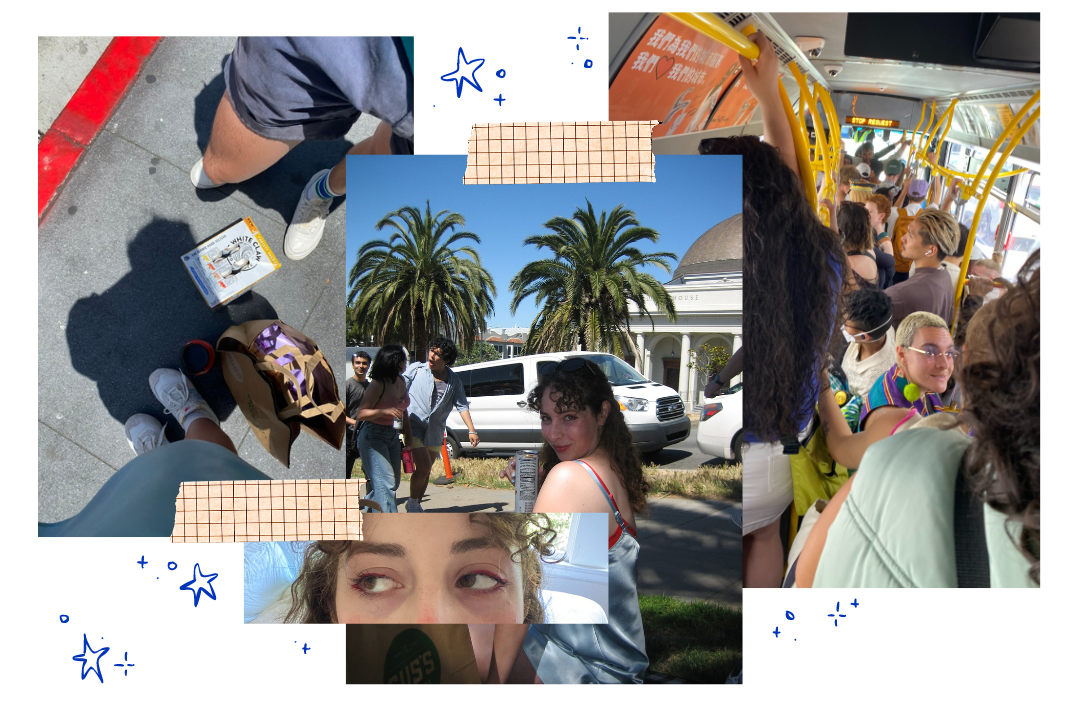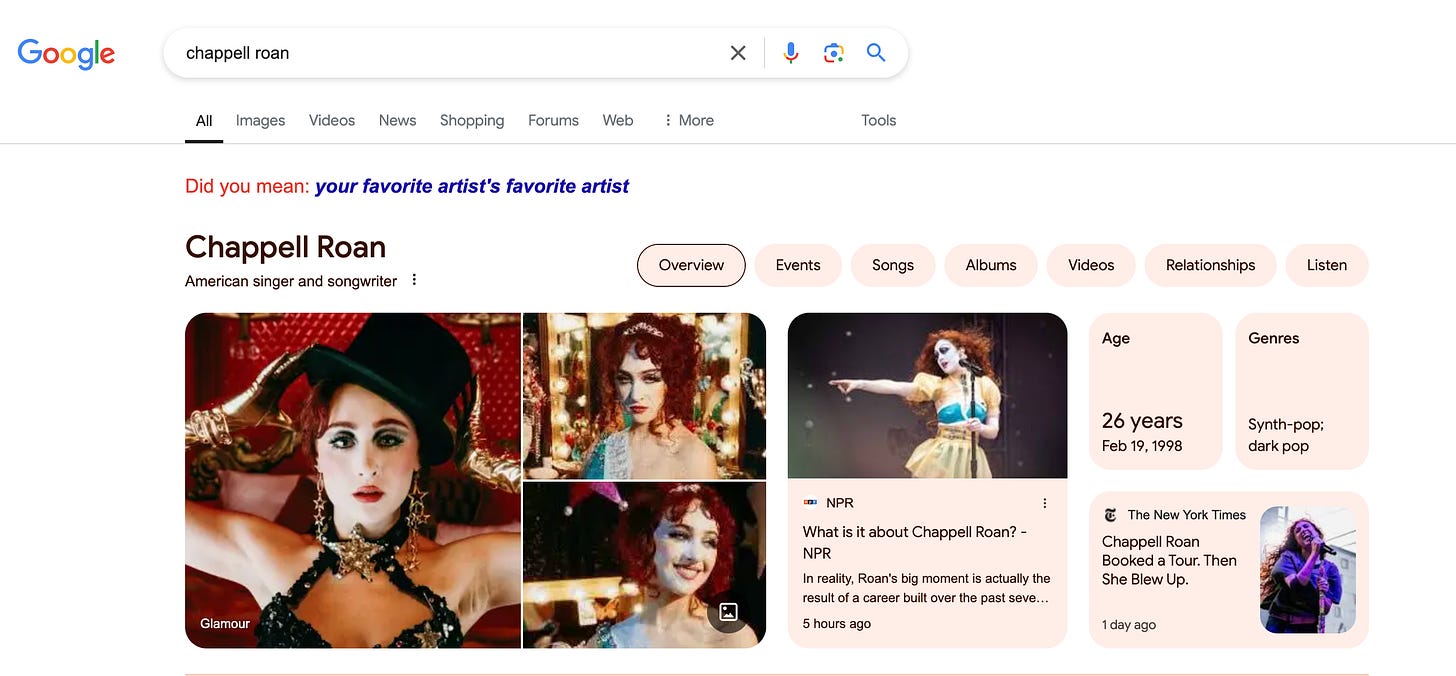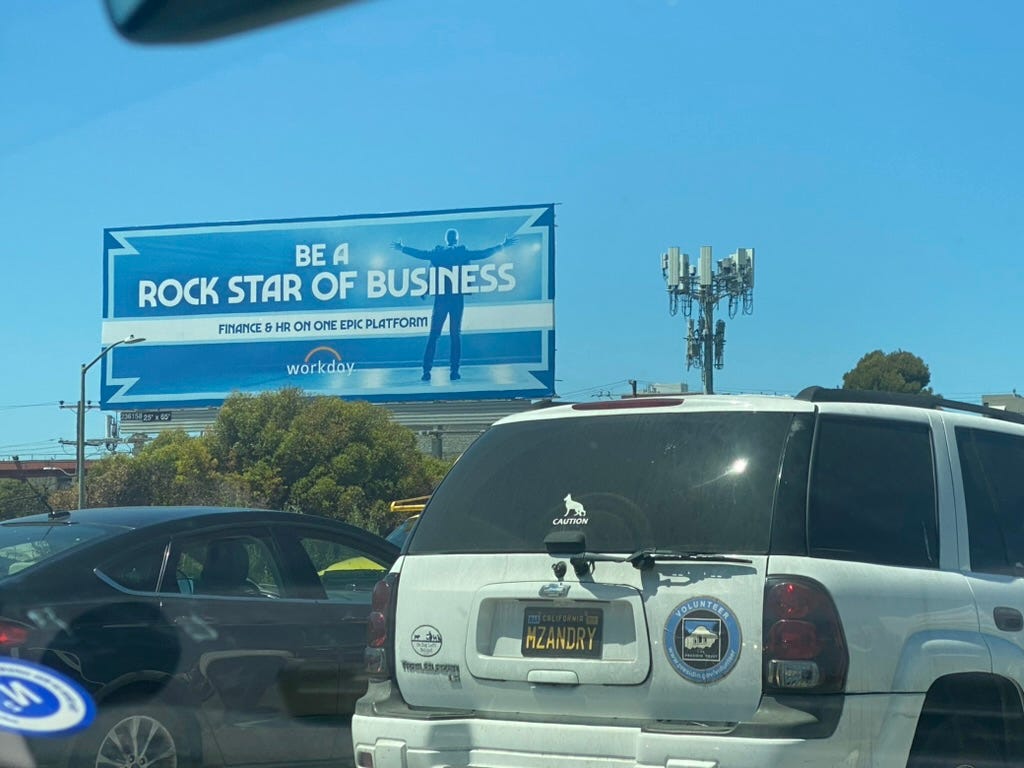Hi hi (◕‿◕✿) Hope you’ve been having a summery summer. Personally my summer has been very summery, roadtripping up and down the great Pacific Northwest, which means I’ve been spending a lot of time in the car. Like any good Angeleno I have a singular love of car time, especially on long coastal roads, but this summer’s car time has been particularly inspiring, thanks to my recent rediscovery of radio. Some truly sublime mundanity, appreciating the little things and all that.
There’s a lot to report, so I’m doing a little Radio Summer series: Over the next couple weeks I’m going to share some tunes I’ve been into recently, and tell you where and how I found them. Not all of them will have come from the radio, per se, but they will all be unusual and earthbound, from me to you. The spirit of radio!
Some of them will be paywalled depending on the accompanying stories, so if you want to read them all, you can get set below.
Today, we’re talking pop. Go here to skip to the album.
Poptimism / techno-striver economics / being more chill
On Substack, the writer Freddie deBoer produces at a maniacal speed that seriously makes me admire his craftsmanship and also wonder a bit about his well-being. Almost daily, he publishes straightforward but pretty substantial essays on media culture and politics. Most refreshingly, his pieces are unapologetic in their angles in a way that much professional and professional-hopeful writing refuses to be—in these days of attention capitalism and a booming class of techo-strivers, always careful not to burn bridges, to “age well,” always scanning for the next pair of rideable coattails out of social media psuedofame and into legitimacy. I find his work interesting and persuasive, and he’s quite the flawed character (which, honestly, should be the basic assumption of everyone), and he says his piece anyway, and that’s sort of the point.
Anyway, I bring up FDB because a couple days ago he posted a screed against “poptimism” and the questionable messaging we’re getting from mainstream music media at the moment, which is that pop artists are critically overlooked underdogs who deserve to be finally taken seriously and uplifted. Pop artists, who are raking in more of our attention and money than musicians of any other genre.
In America, they say bad economies bear great pop music, so one can assume that today’s appetite for escapism is the most intense than it’s been since the last recession, when my parents were getting dicked by the banks and I was blissfully rocking out to Cobra Starship ft. Leighton Meester on my iPod Nano. So naturally, pop is particularly good right now. Of course there’s also the fact that pop music is, by definition, popular music, commercial music. Either way you look at it, no one should be surprised popstars are culturally and literally cashing in at the moment.
So what FDB thinks is so maddening is that despite all that, we’re still somehow at a point where culture writers are laying on the poptimism narrative so thick—and in some rare instances they do call out celebrated pop albums as self-indulgent or formulaic or boring, they’re omitting their own bylines for fear of fan wrath and doxxing.
FDB’s argument is that “it’s mostly all a negotiation with aging. . . Millennials are confronting the end of their youth by performatively embracing youth culture, loudly declaring that the only music that matters is that which you discover on TikTok.” And yes, I think that’s part of it: The mortal tend to get youth-obsessed, and people who live in countries where growing old doesn’t even get you cultural clout (aka respect) tend to get really youth-obsessed. I’ll also say, as a Millennial-Gen Z cusper, I remember firsthand how the culture fucking haaaaated Millennials when they/we were coming up, before much systemic context of their financial and social incompetence was epistemologically adopted. It makes sense that those same sad Millennials might want to emotionally cash in on how much the current culture, on the other hand, loooooves Gen Z and for some reason always has.
So some of the poptimism wave is existential. I also think a lot of it is economic, not only insofar as there’s a recession (btw is there? have we established that? I feel likes yes, but…?), but microeconomic. I’ve already written a lot about how in the last decade or so the viability of a serious arts or arts-writing career for anyone other than the fortunate few has taken a precipitous fall. What I haven’t said, though, is that that means that there are a lot of creative yuppies floating around out there, who might at one point have been able to get a job in music journalism or museum curation or local publishing or what have you, and done the (mainstream) rad work FDB is crying out for. But they need health insurance—for god’s sake, it’s no joke!—so many of them graduated with arty degrees, flopped around, considered the paths forward, and went art-adjacent, toward marketing.
That means that the people living within subcultures (they exist) and the people doing social media for monstrous corporations and political organizations are often one and the same, trying to have a little fun in their sick little cageicles and imbue some of their day job work with elements of cool from their actual lives. (Think: when Chappell Roan said on The Tonight Show that it must’ve been “some random twink who works at Google” who coded the “Did you mean:” joke. Who knows if that’s really what happened, but either way, what was once an in-joke for those in the Drag Race sphere has now been co-opted by multinational conglomerate Alphabet Inc.)
It’s a slippery slope. Companies catch the vibe quickly and then want a brand-friendly version, which is of course distorted. I always think about this when I see the tech billboards off the freeways into San Francisco. I used to see those and think to myself that we seriously deserve the fire and brimstone coming to us. But I also see those and just feel bad for the sucker that helped put it up there. I’m a copywriter; I have also written ridiculous headlines, delivered copy that’s “punchy” and “socially forward” so a reluctantly aging Millennial/Gen X up the chain will approve it, so I can meet my deadlines and go home and make my zines, or freelance for magazines that pay peanuts, or whatever. Ultimately, that person up the chain is probably doing the same thing, except it’s not their zines, it’s, I don’t know, their kids. Am I the banality of evil personified? Father forgive me! The Invisible Hand made me do it! I have not cracked the code of what to about this situation yet. If someone has figured it out and it does not involve having rich parents or selling my eggs, let me know.
I’m not saying that it’s good or righteous. I’m just saying that People Are Stupid Cowards is almost never the whole story. To ignore the broader context of why dumb or self-congratulatory content does numbers, and why doing numbers is more important to the companies who make that content than the content itself, is to pretend we as a society have never had a discussion about clickbait or rage bait or why the townspeople might have their reasons to not point out that the emperor is naked. We have! Somewhere out there Neil Postman is rolling in his grave. What I’m saying is I’ll bet a lot of poptimism writing is being done by people with more awareness than one might think. In many such cases, their hands are simply tied, either by legitimate financial burdens, or by Striving Class psychosocial burdens that corral them into sexy cities and clickbait-shilling careers, or perhaps a combination of both. The media class (social media marketers) is the media class (culture writers) is the media class (DNC staffers). And a lot of what they say is nonsense. It is not an ideal situation, obviously. We’d all love to live in a world become one of salads and sun and humane social policies in America, but you know what Steely Dan says about that, if you listen to more than pop music. . .
(For further reading, yesterday the mysterious Ock Sportello also published a deeper look into all this from the BRAT perspective.)
And so all that brings me to my final point: Earlier this year, a games writer I like named Mikhail Klimentov wrote a newsletter about a very similar situation to this one, where some dumb article was published on the gaming news site Kotaku and people got all up in arms about the degraded state of journalism. Mikhail opened that newsletter with one of the most profound personal philosophies I’ve ever heard:
I think of it often. I agree deeply. (Last year, before I read Mikhail’s newsletter, I also happened to write an essay called “The Gospel of Being Chill,” but I kept it off the internet. Zine-only content.1)
So if you want to stay chill about this, at least from the where-is-all-the-good-music perspective (from the political perspective, it’s a bit hairier), look on the bright side, and see that this leaves a vacuum for cool small artists and indie music writing and for you to feel extra extra special cool for having found those things. The bad news is, small things are hard to find. But keep your ear to the ground; there’s a return-to-print movement warbling, so check the local bookstores, go to art book fairs, read all the telephone pole flyers, scan random QR codes, be open to amateurishness and underproduction. . . What I mean to say is: tune into a different cultural wavelength. Listen to the conceptual radio.
Sad Lovers and Giants by Crystal Murray
A couple months ago, when I first started listening to the radio on my commute up and down the 101, I was listening to 105.3 FM aka LIVE 105, the local dad rock station; I’ll admit I was rocking with the outdated stuff they play on there (RHCP, Good Charlotte, Foo Fighters), you know, in a dingecore kinda way, in a blunt the pleasure centers save me from myself kinda way. At some point, though, the thought finally occurred to my ape brain to hit scan, and I found KEXP 92.7 FM and realized what a chump I’d been the whole time. Some stations really had vision! Love live KEXP.
What they play on KEXP is pretty eclectic—British punk, 80s electronica, classic rock; today I heard Bob Marley and the Wailers; pretty sure there’s a nighttime show that spins mostly ambient music; etc.—but one of the best things I’ve heard on KEXP is a new pop track called “STARMANIAK” by Crystal Murray. This is off her new album, Sad Lovers and Giants, which, for a 22-year-old debut artist, is really strong. Across SLAG, there are synths, there are harps, there are trappy drum beats; it’s aurally crisp and elastic but clearheaded in its electro-ethereality.
Not to judge a book by its cover, but the packaging of this album feels really misrepresentative of how the actual music sounds. The title “Sad Lovers and Giants,” and the name “Crystal Murray” for that matter, evokes a kind of 2010s tweeity, and the album art (see below) is giving Black Eyed Peas “Boom Boom Pow.” Not to say that Will.i.am and fedoras and DJ Earworm mashups have nothing to offer the culture, at least referentially, but it just feels so out of line with what Murray’s doing in SLAG that it actually makes me very curious about the artistic and marketing intentions behind the album title and art. (If Crystal Murray is her real name, I guess I get that one.)
Anyway, if it helps you sort Giants, if not sonically then energetically, know that in June I took a bus from the Haight down to the Mission District for Pride, and it was absolutely jam packed with tipsy 20-somethings dressed up with sparkles and rainbows and obviously headed, like me, to the party at Dolores Park. That bus was moving slow as hell, but instead of standing there stupidly for 30+ minutes, we collectively made that bus the club: I happened to have a speaker in my hand so I ended up literally DJ’ing the 33 all the way to Dolo. I played BRAT, Chappell Roan, Alice Longyu Gao, Artemas, Azealia Banks, Grimes, that song from Saltburn, and Crystal Murray’s “STARMANIAK.”
Other best tracks:
Thanks for reading!

If you want to buy that zine for $5 + shipping, DM me!







As an art degree kid myself trying to survive in this cold dead economy, your analysis is immaculate. The be chill quote feels like a vital lifeline. Roadtrips on the west coast are the best, especially on the 101 which passes through my town! I live in the pnw, and it’s super fun to read about you traveling up here. Some of the best music I’ve found is new tracks I hear on Kexp in Seattle and college radio in Oly (an antidote to the homogenized poptimistic music hellscape imo.) I loved reading this, and I’m cheering for your zine project!
"It makes sense that those same sad Millennials might want to emotionally cash in on how much the current culture, on the other hand, loooooves Gen Z and for some reason always has."
This is a great point, I remember a few years ago there was some basic headline like "Managers finding it hard to communicate with Gen Z workers" and I remember friends and peers and comments all alike lit up with "Don't you fucking dare pull that generational shit with Gen Z, Millennials already spent their whole lives getting shit on." I don't know if Gen X got treated the same way but I feel like Boomers did too and that's one reason why they're so fucking brittle about aging, at least the Boomers I know and pay attention to (anywhere from family members to the ones in politics and media).
It might be a cyclical thing, one generation gets constantly shit on for being young, becomes age obsessed, decides they won't pull that shit on the next generation, and that generation then feels like they're pretty widely accepted as cool so when things change they shit on the next generation? Maybe? I don't want to cling too hard to that notion because that's about as far as I get before I remind myself that generations don't exist except as marketing devices and identity politics, two of the most poisonous things to the modern efforts of living together respectfully in a pluralistic society.
So anyway I'm choosing the live and let live approach. Let the Gen Z kids like stuff I don't like, enjoy the Gen Z stuff I like, and don't bother to try to understand it more than just have my own opinions on it. Gen Z "gets a pass" I never did (I mean seriously, grown ass adults were lecturing me about how garbage my generation was when I was like 11 and 12 years old) but I feel like Millennials are getting a little defensive about that and should let it go rather than percolate in resentment. Whatever, our elders treated us like garbage. No reason we should either feel like garbage or treat others like garbage. Let's just improve the world.
So these wider "poptimism" debates tend not to be very interesting to me, but when you've framed it as you have here I at least have some access to what may be really being discussed.